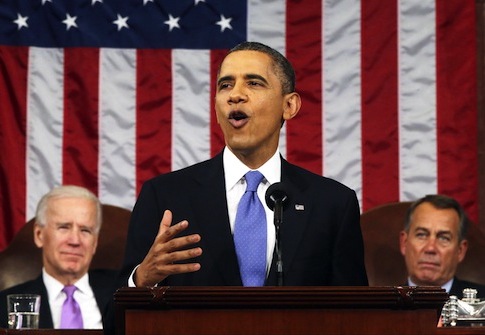President Barack Obama called on Congress to raise the federal minimum wage to $9 an hour during his State of the Union despite concerns from some economists that the increase would hamper an already weak economic recovery.
The hike would represent a 24 percent jump from the current federal minimum wage of $7.25 an hour.
"We know our economy is stronger when we reward an honest day’s work with honest wages," Obama said. "That’s why, since the last time this Congress raised the minimum wage, 19 states have chosen to bump theirs even higher."
However, those 19 states boast some of the highest unemployment rates in the nation, especially among the teenagers who make up the majority of minimum wage earners.
Only two states with minimum wages above the federal level have youth unemployment rates that rank among the best-performing 10 states in the nation. Of the 10 states with the highest teen unemployment rates, six have higher minimum wages than the federal standard. About 30 percent of teenagers are out of work in Washington state, the only state with a minimum wage above $9 an hour.
Michael Saltsman, research director at the Employment Policies Institute, says minimum wage increases often lead employers to cut hours or lay off workers as they try to cope with rising labor costs.
"States that do this place barriers to employment that hurt workers," he said. "Just because their hourly wages went up doesn’t mean they’re getting annual increases. Some workers benefit, but many lose out."
Political insiders were surprised Obama included a higher minimum wage in the laundry list of goals he laid out during the speech. The announcement pleased many in his base. For example, labor groups praised Obama for the proposal, saying it would lead to "rising wages and good jobs."
"We applaud the president for expressing support for raising the minimum wage and tying it to the cost of living," said AFL-CIO president Richard Trumka.
Dr. Mark Perry, a scholar at the American Enterprise Institute, said raising the minimum wage would not alleviate the long-time stagnation of wages because it could lead to increased unemployment.
"We’re struggling in a jobless recovery; this would price unskilled workers out of the labor market," he said. "Wages go up when there are labor shortages and higher competition for workers—we have such a high unemployment rate right now that can’t happen."
Obama said during his speech, "A full-time worker making the minimum wage earns $14,500 a year. Even with the tax relief we’ve put in place, a family with two kids that earns the minimum wage still lives below the poverty line."
"Tonight, let’s declare that in the wealthiest nation on Earth, no one who works full-time should have to live in poverty, and raise the federal minimum wage to $9.00 an hour," Obama said. "This single step would raise the incomes of millions of working families."
Obama may be exaggerating the benefits of his policy, however.
"There were almost 45 million workers nationwide who were paid hourly wages and working full-time (40 hours or more) in 2011. Of those full-time hourly workers, 98.3 percent were earning more than the minimum wage, and only 743,000 (and 1.7 percent) were earning the minimum wage or less," Perry wrote in a blog post.
The majority of minimum wage earners are young and unmarried not the breadwinner described by Obama, according to a 2011 the Bureau of Labor Statistics report, the most recent year available.
"Minimum wage workers tend to be young," the report states. "Although workers under age 25 represented only about one-fifth of hourly-paid workers, they made up about half of those paid the federal minimum wage or less. Among employed teenagers paid by the hour, about 23 percent earned the minimum wage or less, compared with about 3 percent of workers age 25 and over."
Those workers have enough trouble finding a job as they lack the experience and education levels of older workers, according to Saltsman.
Minimum wage work for many is a stepping stone for their careers: Missing that step because of fewer job openings can have a long-term impact on their careers, he said.
"Teenagers are missing out on the skills and experience of entry level employment," he said. "Today’s CEOs didn’t start out running companies; they started waiting tables and tossing newspapers. We have a generation that will not learn valuable skills."
Employers are quick to recognize those skills. The BLS found that the majority of workers paid by the hour earn more than $7.25 an hour, a sign that workers are only at the minimum wage for a short time period, according to Perry.
"Raising the minimum wage sounds wonderful, but if it was so good for the economy, why not raise it to $19 or $29? They wouldn’t do that because it would displace people who need those skills and those jobs," he said. "You hurt the most vulnerable people in the workforce when you do that."
